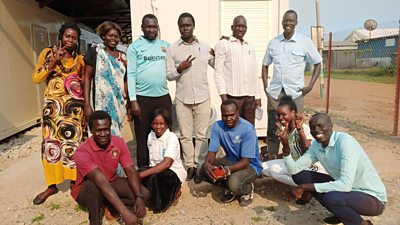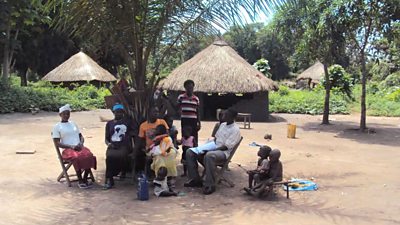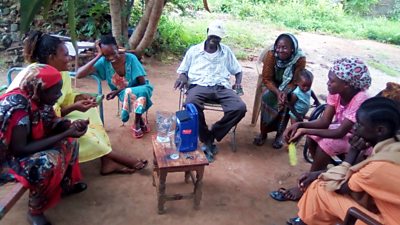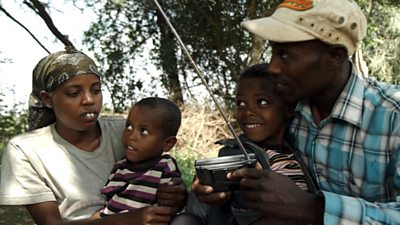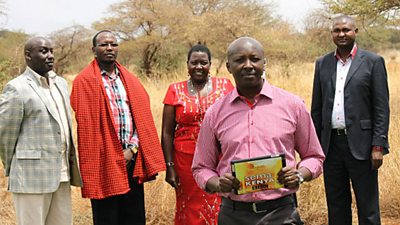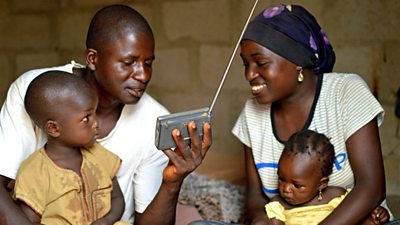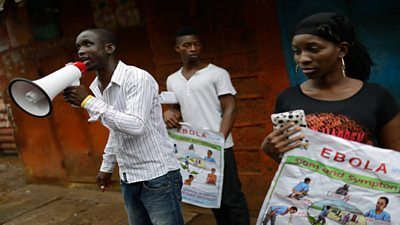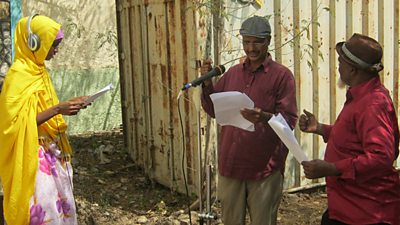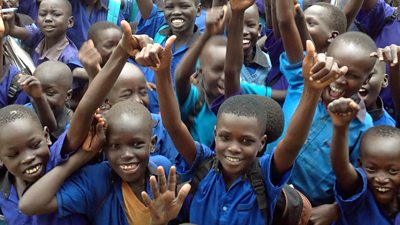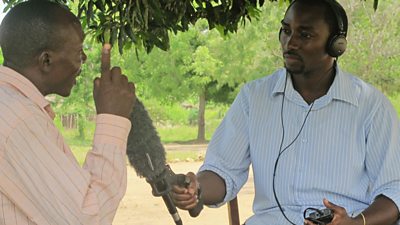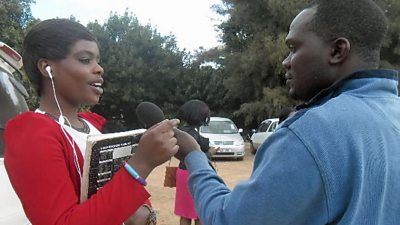Our South Sudan radio drama, Life In Lulu, is celebrating 10 years on air. Its storylines have covered beliefs about health, conflict and peaceful co-existence, with its main characters journeying through life’s ups and downs, along with its audience. Much like UK audiences tune into ��ѿ��ý’s The Archers each week, Life in Lulu enjoys a similar profile and popularity in South Sudan – all while tackling difficult and sensitive topics, and providing hope for change.
Life in Lulu’s creators, writers and cast members spoke about this landmark celebration and the show’s future. In the words of its head producer, Zuhur Noah: ‘It depicts a fictional village that represents a real village full of diversity’.
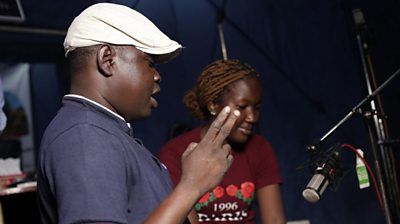
Zuhur Noah, producer, and Kululu Elgebana, scriptwriter
Kululu Elgebana is Life in Lulu’s main script writer, who says his writing team of six is ‘all about teamwork’ when it comes to creating the show’s vast pallet of stories. There are also six freelance translators who translate each episode of the show into, you guessed it, six different languages. Each season starts with a writing room session between the writers and the ��ѿ��ý Media Action team, where they discuss project objectives.
Head producer of the show, Zuhur Noah, was drawn to the project because she wanted to ‘tell important stories around issues of maternal and child health’ in South Sudan, using artistic expression and drama.
When asked how the show is shaped once a script is completed, Zuhur said:
“Even if the scripts are written, and the actors rehearse using the script, sometimes you find they’re so into the character, they come up with lines or a joke that is funnier than what is in the script!”
“Even if the scripts are written, and the actors rehearse using the script, sometimes you find they’re so into the character, they come up with lines or a joke that is funnier than what is in the script!”
Much of the script is based on reality discussed in the writers' room.
Kululu draws in part on his own experiences as a child drafted by the Sudan Liberation People’s Army into their ‘Red Army’ of children. Like so many other young South Sudanese boys, he learned to fire an AK-47 at just 12 years old. Today, Zuhur describes the children who were drafted into this army as “lost boys”; the two have found a way to draw on these experiences, and those of other script writers, into Life in Lulu.
“It sounds real. We have a character called Victor who was once a soldier, and Kululu really contributed a lot in terms of developing that character and how he moved from being a soldier, integrating into the community, and now to having a life.”
Audience research helps develop these stories, and Zuhur says the show’s listeners relate to these stories, because they are modelled closely on what happens in South Sudanese communities.
Life in Lulu’s troubled antagonist, Majak, is one example. The hot-headed son of the former chief, many storylines involve him plotting against Lulu’s current elected Chief Faida. But both Zuhur and Kululu admit they have a soft spot for him.
“I like how we’ve developed these characters and thinking about why they behave the way they do,” said Zuhur.
Kululu said: “Majak is always making the story lively”.
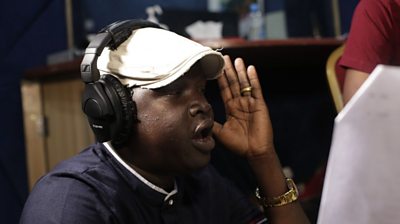
Richard Kandak - 'Majak'
Richard Kandak said he ‘started from zero’ when he first got the role of Majak.
“It is not that easy. I really had to fit myself in to become interesting, but I really enjoy playing that role. Majak is really what is happening in our community. People learn from him and really correct themselves.”
But Richard is as surprised as anyone that his beloved antagonist has become a lead character in the show.
Majak doesn’t believe women should be in charge of Lulu But the son of the past chief lost the local election for village chief to leading female character, Faida. He’s known for making quick, rash decisions and is prone to resorting to violence.
“When I’m acting, sometimes I feel sorry for him. It gets embarrassing, but what he’s going through is what people in our community are going through. Sometimes, he knows what he’s doing is wrong, but it’s a role he’s playing.”
As the 'bad boy' antagonist, Majak splits audience opinion. But he has gradually become one of the most interesting characters in the show, and a main reason South Sudanese audiences have switched on the radio every week for so many years.
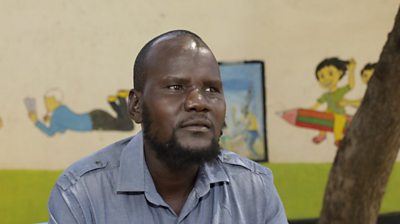
Magdoline Joseph - 'Chief Faida'
Magdoline Joseph saw Life in Lulu as an ‘exciting challenge,’ where she’d take her character, Faida, seriously in order to get the best results.
She studied drama, but mostly theatre, at university, so she found expressing herself on radio a challenge.
“I had to use my voice to express everything. My emotion, my anger and happiness, I have to express using my voice. It was hard because I talk flat. I took some time to understand how to use my voice according to what is needed.”
Magdoline has grown with the show over the past 10 years, learning new things along the way. Her character was only a teenager when the show started a decade ago, and over that period of time, the show has examined how gender-based violence is normalised, and conflict between different groups in society. Both actor and character have seen it all.
She believes her character has helped lead the way for an increased number of woman leaders in South Sudan:
“I’m proud of the time we covered conflict resolution. Life in Lulu, especially Faida, covered it very well. Faida manages to resolve conflict in a peaceful way. The communities in South Sudan managed to adopt some of Faida’s ways in conflict resolution.”
Magdoline says that she and Faida have almost become one and the same and she finds herself getting angry, both in character and in real life, when in conflict with what she calls the “typical South Sudanese man,” Majak. His character represents a barrier for many women in her society.
But it’s the show’s accomplishments within the community and her country that she’s most proud of.
“When we started tackling issues of GBD (gender-based violence), [women] reached out for help. Woman leaders have admitted to taking ideas from Faida. I also manage to help other drama teams to have a similar focus to Life in Lulu and change behaviour [in society].”
Perhaps no other character better represents the challenges in South Sudanese society, and their hopes for change as represented in Life in Lulu, than Chief Faida and the inspirational woman who plays her.
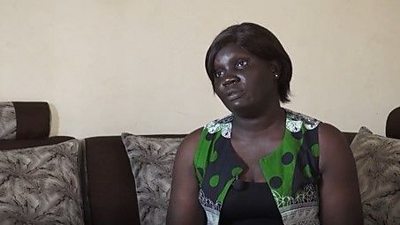
--
What is next for Life in Lulu, with this round of funding at an end?
“I want to see unique storylines. Small things we need to work on, like issues to do with governance,” Kululu said.
Zuhur remains positive, despite the challenges.
“There are breaks in funding and sometimes we have to lose the production team for a while. But the good thing is, that when we’re having these breaks, radio stations never stop broadcasting, because there is demand,” she said.
“I think it will continue adapting to the situation in South Sudan. We have upcoming elections, so Life in Lulu might go that way, but also thinking about women and youth because they’re our target audiences.”
For Life in Lulu fans, this beloved show is in safe hands.
-
The latest season of Life in Lulu has been funded by Global Affairs Canada and the Norwegian Ministry of Foreign Affairs; previously it has been funded by the UK Foreign, Commonwealth and Development Office (previously DFID) and Danish Church Aid.
Read more about Life in Lulu
Our research and insight from Life in Lulu
Learn about our projects in
Search by Tag:
- Tagged with South Sudan South Sudan
- Tagged with Africa Africa
- Tagged with Addressing conflict and bridging divides Addressing conflict and bridging divides

